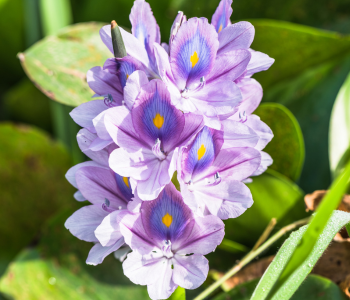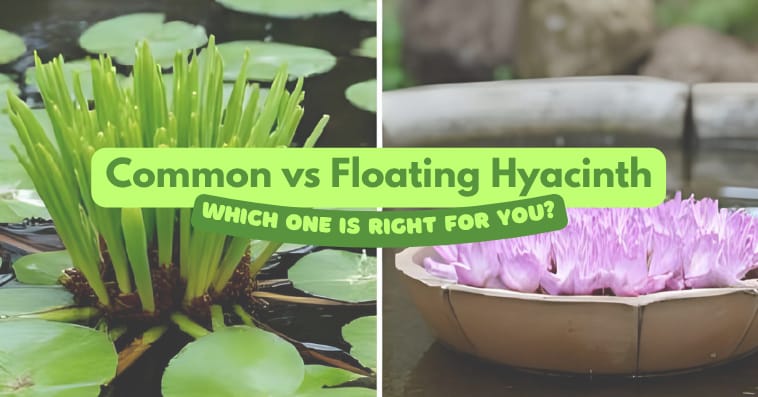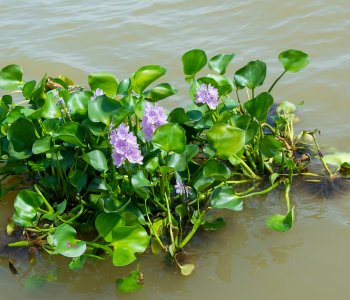Water hyacinth is a vibrant, eye-catching aquatic plant beloved by pond enthusiasts and eco-gardeners alike. But did you know there are two popular variant s— Common Water Hyacinth (Eichhornia crassipes) and Floating Hyacinth (a cultivated, ornamental variant)? If you’re a gardener considering adding one to your aquatic setup, you’re in the right place. This guide will help you compare their features, care needs, benefits, and drawbacks — so you can confidently decide which one suits your pond or aquarium best. And, when you're ready to purchase, you can buy from Paudhewale — your trusted online nursery.
What Are Common Water Hyacinth and Floating Hyacinth?
🌱Common Water Hyacinth
Also known as Eichhornia crassipes, common water hyacinth is the wild-growing version found in rivers, lakes, and ponds worldwide. It's known for:
Fast growth and rapid reproduction
Large, thick green leaves and light lavender-purple flowers
Long, feathery roots dangling beneath the water surface
Once prized for beauty and filtration, this variant is now considered invasive in many regions due to its aggressive growth.

🌸Floating Hyacinth
Floating hyacinth, often referred to as “ornamental” or “non-invasive” hyacinth, is typically a cultivated variant:
Bred for more compact growth
Smaller root systems
Slower spread
Often available with varied flower colors—lavender, pink, sometimes even white
It retains the charm of common hyacinth but is better suited for controlled environments like home ponds and aquariums.
Head-to-Head Comparison
| Feature | Common Water Hyacinth (Eichhornia crassipes) | Floating (Ornamental) Hyacinth |
|---|---|---|
| Growth Rate | Very fast – can double in 7–10 days | Controlled – slower, easier to manage |
| Invasiveness | Highly invasive – may clog waterways | Low – ideal for contained setups |
| Root System | Large, dense, feathery | Moderate, compact root network |
| Flower Variety | Light purple flowers | Purple, pink, white, multi-color |
| Maintenance Level | High – regular thinning required | Moderate – occasional upkeep needed |
| Ecosystem Benefits | Superior filtration, oxygenation | Good filtration with less upkeep |
| Suitable For | Large ponds, natural water bodies | Garden ponds, aquariums, containers |
Benefits of Common Water Hyacinth
Natural Water Filtration
Common hyacinth excels at absorbing excess nutrients like nitrate and phosphate, helping to reduce algae blooms.Oxygenation & Habitat
Its dense root mass oxygenates the water and offers shelter to fish, frogs, and beneficial microorganisms.Fast Growth Advantage
If you need rapid coverage to balance a nutrient-rich environment, this hyacinth thrives—but be ready to manage its spread!Wild Beauty & Authenticity
Perfect for natural ponds and wetland gardens, adding ecological authenticity and a native feel.
⚠️ Note: Its aggressive growth can block sunlight and oxygen if left unchecked. Not ideal for small or formal water gardens.
Benefits of Floating (Ornamental) Hyacinth
Stable & Manageable Growth
Slower spreading minimizes maintenance—great for container ponds and aquariums.Colorful Blooms & Aesthetic Variety
Gardeners and aquascapers love the range of pinks, whites, and purples.Ideal for Indoor/Patio Ponds
Less risk of clogging filters or over-shading surface light.Similar Water Quality Benefits
Still absorbs nutrients and offers habitat but on a smaller scale.
Potential Drawbacks & Solutions
Common Water Hyacinth
Clogging and Overgrowth: Requires weekly thinning or netting.
Legal Restrictions: Classified as invasive in many regions—you may need permits to grow or sell.
Maintenance Demand: Needs vigilant removal of excess plants.
Floating/Ornamental Hyacinth
Less Dramatic Growth: May not cover large ponds quickly.
Limited Root Filtration: Filtration and oxygenation capacity is modest.
Slightly Higher Cost: Ornamental variants often come at a premium due to cultivation.
Choosing the Right Hyacinth for Your Garden
Here’s a quick checklist to help you decide:
| Question | If Yes → Choose Common Water Hyacinth | If Yes → Choose Floating Hyacinth |
|---|---|---|
| Do you have a large open pond or natural body of water? | ✅ | |
| Do you want wild, lush coverage, and don’t mind regular maintenance? | ✅ | |
| Is your goal decoration or aesthetic appeal with moderate upkeep? | ✅ | |
| Are you dealing with a small pond, tank, or container pond? | ✅ | |
| Worried about invasive spread or legal restrictions? | ✅ |
Care Tips for Both Variants
🌾 Planting & Setup
Simply float them on (no soil needed).
Provide full to partial sunlight (4–8 hours/day ideal).
Water temperature: 18°C–30°C. Both prefer tropical to subtropical conditions.
🎯 Maintenance Essentials
For common hyacinth, thin plants weekly to prevent overcrowding.
For floating hyacinth, remove dead leaves and trim roots occasionally.
Periodically rinse both to wipe off algae, especially from roots.
💧 Water Quality Benefits
Leaves help oxygenate and shade, while roots absorb excess nutrients—cleaning algae and improving clarity.
Installation Ideas & Best Practices
Pond Makeover
Begin with a mix: common hyacinth for quick coverage and floating hyacinth for color. Thin the common variety as it grows to keep a balanced aesthetic.Patio Pond or Water Feature
Use floating hyacinth for a low‑maintenance, decorative finish that still adds ecological benefits.Fish Tank or Turtle Tank
Floating hyacinth is ideal—it provides natural shelter, hides lights, and absorbs excess nutrients.Educational Greenhouse or Classroom Display
Combine both for an informative demonstration of plant growth rates and ecological impacts—perfect for teaching biology.
How Much Do They Cost Online?
Common Water Hyacinth: ₹50–₹150 per bunch (usually cheaper, but check regional legality)
Floating Hyacinth (Ornamental): ₹120–₹300 per bunch
Bulk or combo packages often offer discounts and variety.
Remember: cheaper doesn’t always mean better—quality and condition matter more!
Where to Buy Healthy Water Hyacinth
Buying from reliable, reputable sellers ensures you receive disease-free, well-packaged plants primed for success. That’s why we recommend Paudhewale —India’s leading online nursery for aquatic plants.
🌼 Why Choose Paudhewale?
✅ Wide selection of common & ornamental hyacinths
✅ Healthy, pest-free, nursery-grown stock
✅ Safe, insulated packaging for delivery
✅ Transparent pricing and fast dispatch
✅ Expert gardening tips and plant care support


